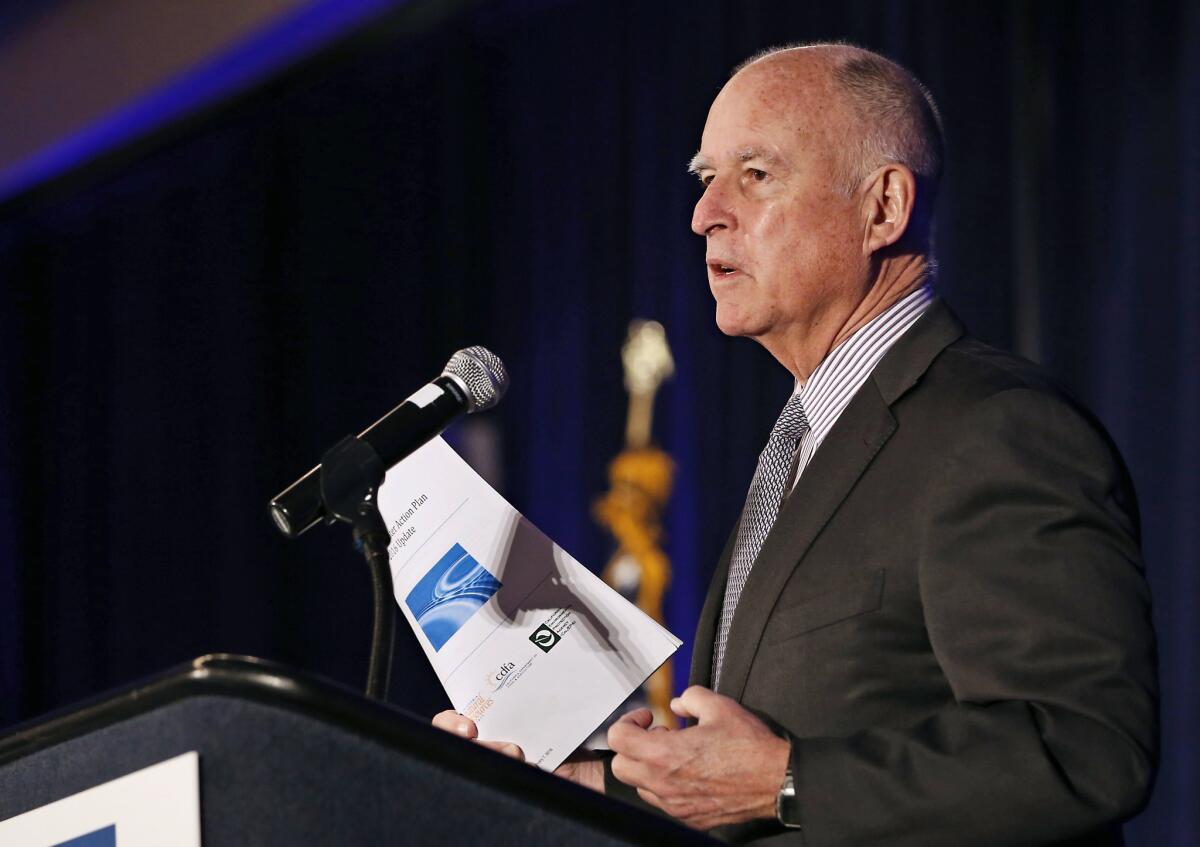Brown defends delta tunnels as he rolls out tweaks to water plan

- Share via
Reporting From Sacramento — Gov. Jerry Brown warned Thursday that if his multibillion-dollar delta tunnels project fails to move forward, it would deal a “body blow” to California’s economy and prosperity.
Hoping to combat the idea that building the massive tunnels is simply a water-grab that would benefit Southern California, Brown reiterated that Bay Area cities such as Livermore and Santa Clara derive large swaths of their water supply from the Sacramento-San Joaquin Delta.
“We run the very substantial risk that water to Silicon Valley will be cut off and California’s engine of wealth and innovation will be dealt a body blow. And I don’t think anyone in their right mind would want that,” Brown said after an event hosted by the Assn. of California Water Agencies.
Brown’s comments came as his administration rolled out an update to a state water action plan, launched in 2014 as a road map for managing California’s water.
See the most-read stories this hour >>
The revised plan continues to focus on conservation, repairing fish habitats, and preparations for the state’s next drought. It also takes into account major changes instituted over the last two years, such as mandatory cuts to water usage, lawn restrictions for new housing developments and better groundwater management.
But Brown used the rollout of the updated plan to express a sense of urgency to complete the delta tunnels, which he has said are crucial to the state’s future.
“If we build the conveyance correctly, if we manage it … then we can produce more water reliably, and the whole system will work better for people, farmers and fish,” Brown said Thursday. “And if we don’t get that, the water wars will continue.”
The so-called “delta fix” pushed by the governor would build two massive tunnels underneath the Sacramento River, bypassing the delta to deliver water from the north to the semi-arid south, home to most of the state’s population.
Consensus on changes to the state’s water delivery system has proved elusive; residents of the delta region resent that their water is being routed south, environmentalists have pressed concerns over the fish that get sucked into pumps, and San Joaquin Valley farmers complain that limits placed on pumping to protect fish have decimated their farms.
To those who say forget the fish: No. The fish are part of God’s creation as are we, and we all have to make it work.
— Gov. Jerry Brown, on finding a Delta water fix
A coalition of labor and business groups voiced support for Brown’s plan Thursday.
“Expanding water storage above ground and below ground is necessary – but ineffective if there is no way to reliably transport that water across the state,” said Michael Quigley, executive director of the Alliance for Jobs, one of a number of groups touting the plan.
The Santa Monica-based Natural Resources Defense Council said in a statement that Brown’s proposal doesn’t do enough to restore the delta’s ecosystem and that California should be focusing more on local efforts to capture stormwater instead of letting it flow to the ocean.
The govenor’s plan “not only distracts local agencies from making these key investments, but it also fails to improve and reduce diversions from this precious estuary,” the group said in a statement.”
Brown has already been forced to scale down his delta project, which drew scrutiny from federal fishery regulators. The pared-down proposal is still under review by state and federal agencies. Construction of the tunnels will cost an estimated $15 billion.
“This is not a nicety,” Brown told reporters after the event when describing the tunnels project. “It’s a fundamental necessity of California’s current and future prosperity.”
For more on California politics, follow me @cmaiduc.
MORE FROM POLITICS
Kamala Harris backs bills to close loopholes in California assault weapons ban
Californian to help lead super PAC focused on registering Asian American voters
Nancy Pelosi’s vineyard makes her fourth-richest Californian in Congress
More to Read
Get the L.A. Times Politics newsletter
Deeply reported insights into legislation, politics and policy from Sacramento, Washington and beyond. In your inbox twice per week.
You may occasionally receive promotional content from the Los Angeles Times.











